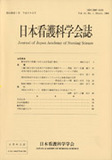Japanese
English
- 販売していません
- Abstract 文献概要
- 参考文献 Reference
- サイト内被引用 Cited by
要旨
本研究は,妊娠末期から産褥6週までの母親の睡眠を経時的に追跡し,その睡眠パターンの変化過程を明らかにすることを目的とした.対象は,母乳栄養を希望していた正常初産婦10例である.データは,対象一人について普段の環境下で縦断的に4回,妊娠末期(妊娠36週以後)・産褥1週間目・産褥3週間目・産褥6週間目に測定した.睡眠脳波測定用具には脳波・筋電図・眼球運動・心電図を入力し,また,こどもの覚醒を把握するためにこどもの足の動きを同時に測定した.
その結果,産褥早期の母親の睡眠は,妊娠末期に比べて睡眠率が有意に減少していた.睡眠段階からみると途中覚醒時間の増加(%w)と全睡眠期間に対するStage 2の比率(%S2)の減少として観察された.しかし,REM睡眠や徐波睡眠の量に変化は認められなかった.
この変化は,産褥1週目から認められ,3週目,6週目に至っても継続していた.
Abstract
Mothers in postpartum periods are forced to be awake at night in order to take care of their babies. It is important to investigate relationships between the sleep patterns of postpartum mothers and their babies' activities under conditions in daily life to determine effects on their health. In this study, changes in sleep parameters of young women from late pregnancy to the 6th postpartum week were studied using the ambulatory EEG monitoring system.
Subjects were 10 primiparae, aged 23-31 yrs (mean age of 26.8 yrs), who had a normal course of pregnancy and delivery. EEG, EMG, EOG and ECG of the mothers and their babies' actigrams from legs during sleep were simultaneously recorded using Medilog 9000 at home at four points: during late pregnancy (36 weeks), and the 1st, 3rd and 6th postpartum weeks.
In the late pregnancy period, mean sleep efficiency for the 10 subjects was 94.5%, and mean total sleep time was 368.8 min.
We compared the sleep parameters of four points using a two-way analysis of variance (point x subject). Total sleep time showed no significant differences among the four points (postpartum 1st week: 336.8 min, 3rd: 314.2 min, 6th:312.6 min.). Percent of waking time after sleep onset in the 1st postpartum week (21.1%) significantly increased compared with late pregnancy (5.4%), but did not change through the 3rd (19.7%) and 6th week (20.7%). The percent of stage 3+4 and stage REM did not change across the four points, but the percent of stage 2 in the postpartum period (1st week: 39.7%, 3rd: 41.2%, 6th: 41.0%) significantly decreased compared with late pregnancy (59.6%). There were no significant differences in the number of awakening among the four points.
In conclusion, wakefulness after sleep onset during postpartum period increased compared with late pregnancy. The mothers' sleep pattern did not change through the 1st, 3rd and 6th postpartum weeks. These findings suggested strongly that their sleep was interrupted by their babies' activities, as shown in another abstract.
Copyright © 1994, Japan Academy of Nursing Science. All rights reserved.


